Contact Us
To provide feedback on the Community Policing Dispatch, e-mail the editorial board at CPDispatch@usdoj.gov.
To obtain details on COPS Office programs, publications, and resources, contact the COPS Office Response Center at 800-421-6770 or AskCopsRC@usdoj.gov

U.S. Department of Justice
Office of Community Oriented Policing Services
Washington, DC 20530
In honor of Black History Month and in recognition of the valuable contributions of women of color to American law enforcement, Faye Elkins, Senior Technical Writer for the Office of Community Oriented Policing Services (COPS Office), conducted phone interviews with five extraordinary women in law enforcement:
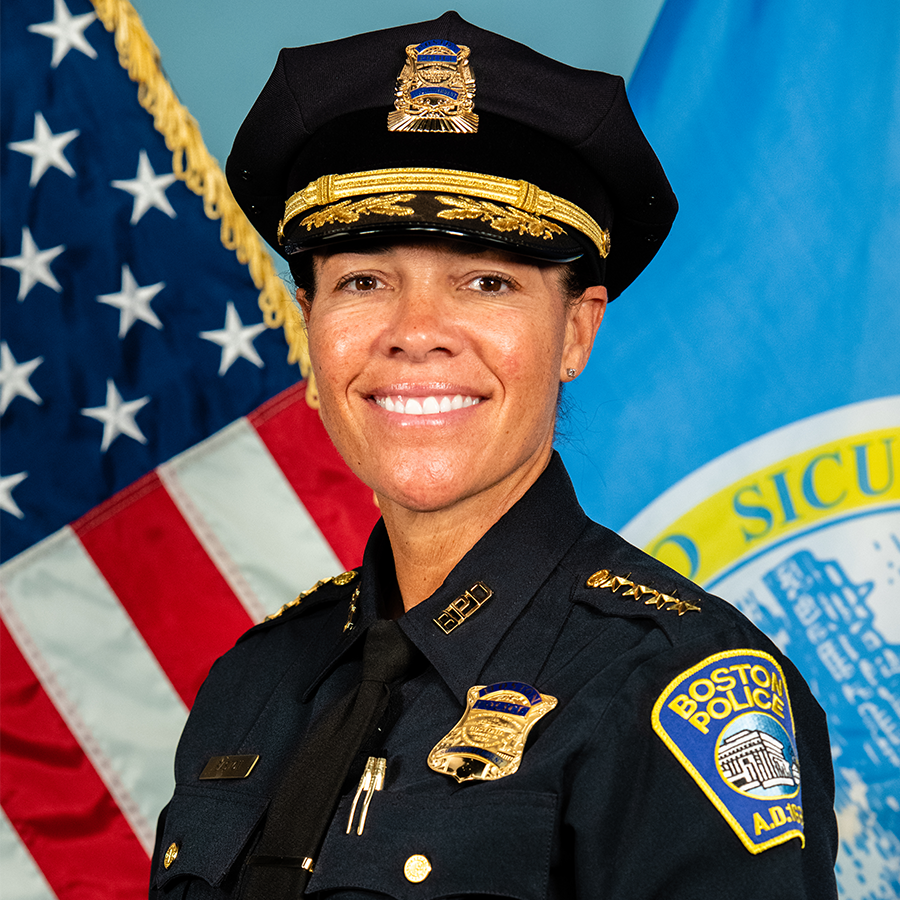
Deputy Superintendent Nora Baston of the Boston (Massachusetts) Police Department
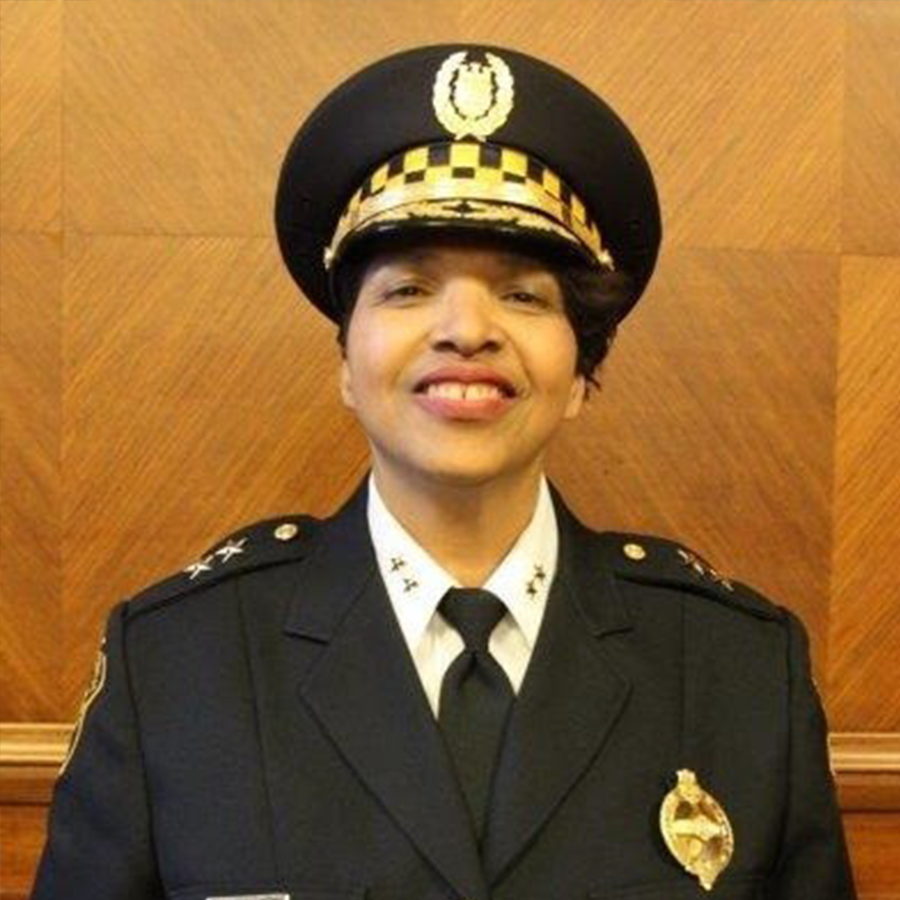
Assistant Chief Lavonnie Bickerstaff of the Pittsburgh (Pennsylvania) Bureau of Police
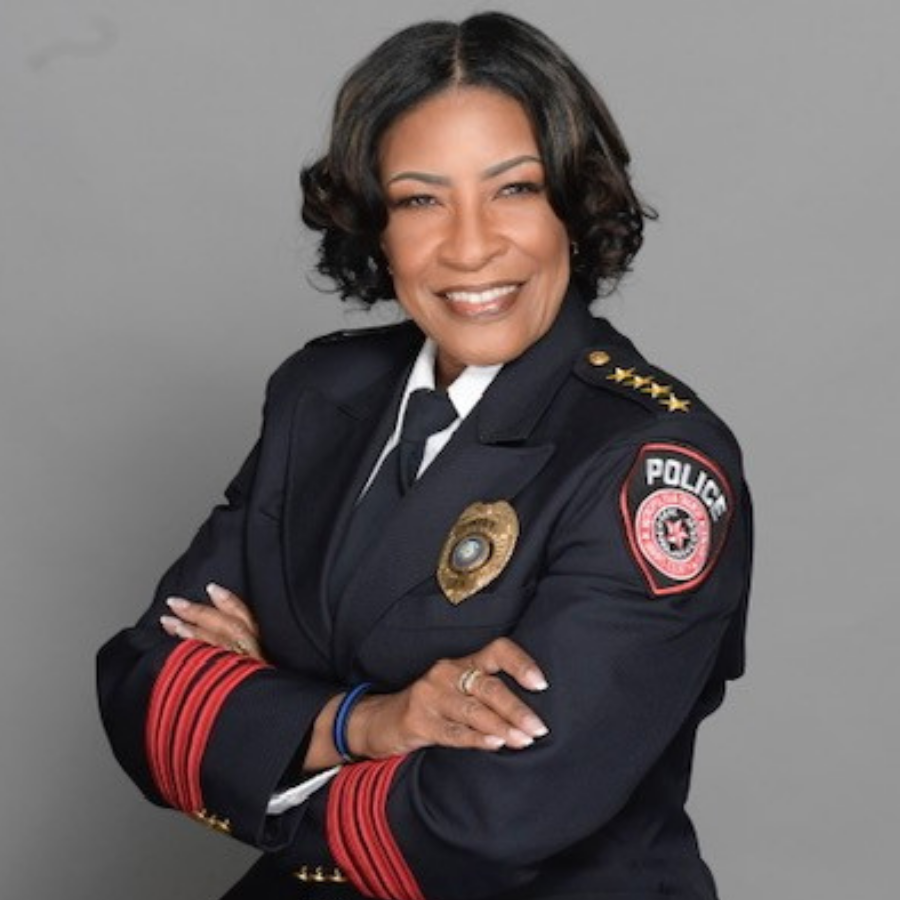
Chief Vera Bumpers of the Harris County Metro Transit Authority Police Department in Houston, Texas
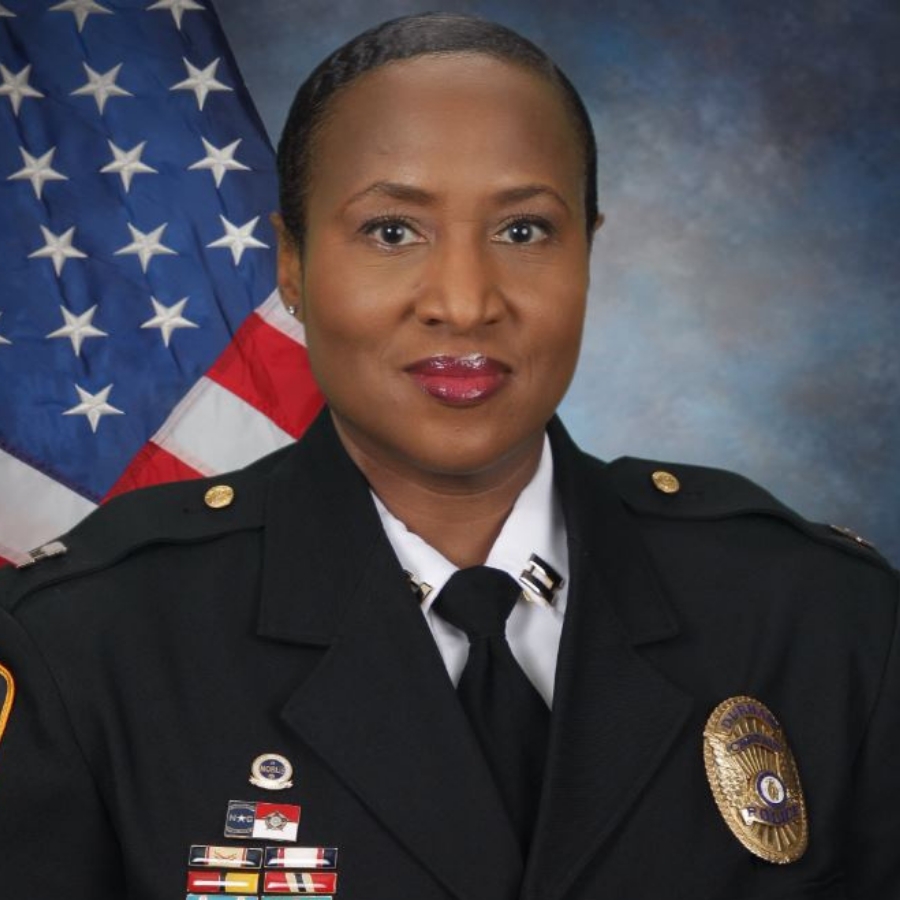
Captain Denise Campbell of the Durham (North Carolina) Police Department
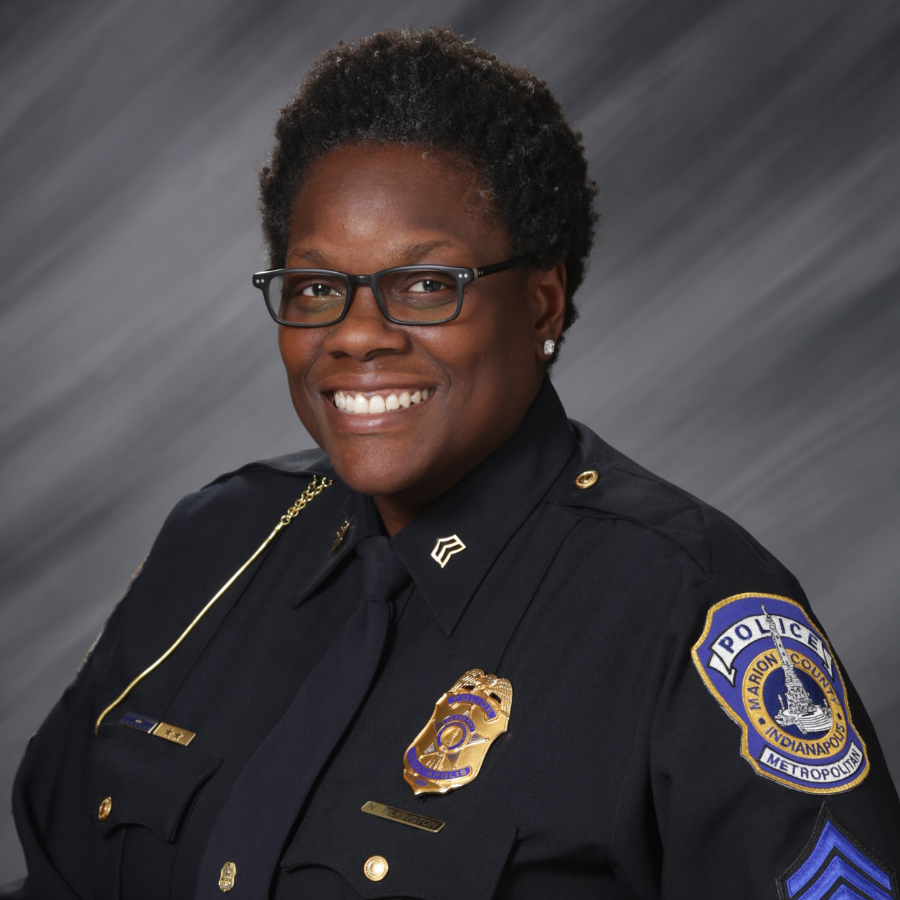
Sergeant Nikole Pilkington, of the Indianapolis (Indiana) Metropolitan Police Department
Recognizing this, the National Association of Women Law Enforcement Executives (NAWLEE) has partnered with the NYU School of Law Policing Project in the 30x30 Initiative, which was created to encourage law enforcement agencies to increase the number of women in their recruitment classes to 30 percent by 2030.
Since it was launched in March 2021, more than 140 police agencies have signed the 30x30 pledge to recruit more women. But those who already serve in law enforcement, especially women of color, still face challenges.
While they experience less overt sexism and racism than in the past, law enforcement agencies still often have a “boys club” environment, with less career support and room at the executive table for female officers.
All the women interviewed for this article felt they had to work harder than their male counterparts in law enforcement to establish their competence and advance through the ranks. As one interviewee put it, ”You need to be not just on your A game, but your A+ game, if you want to be heard and respected.”
But each interviewee also said that she got some support from Black and White men in their department, and all have high regard for their colleagues. Moreover, every one of these women feels a strong sense of accomplishment from knowing that they have made a real difference in people’s lives, and all were unequivocal in saying that they love their jobs.
Sexism and Racism
Baston: In my experience, it’s more about sexism than racism. Black, Brown and White guys get ahead faster and women don’t have the support they do. But that’s changing.
When I was first promoted in 2007, I was the only woman on the command staff. Now we have five, as well as many other women in command positions in units such as Criminal Investigations, Sexual Assault, and Family Justice.
Bumpers: Most men don’t want a woman telling them what to do—as soon as I became their boss, some of the men, Black and White, changed. That isn’t about color, it’s about gender.
Bickerstaff: When you start competing for assignments, that’s when you experience sexism and racism. When people are walking alongside you, they are fine; but when you are competing, it’s different.
Just because we are in charge doesn’t mean we don’t face sexism and racism. But diversity has dropped off somewhat just because it’s difficult to get people involved in policing now.
Pilkington: There is racism, but it is not direct and has gotten better over time. I usually hear what is said second- or thirdhand.
I scored really well on the promotional test for advancing to sergeant. But I found that whenever a black woman does well in a promotional exam we are accused of cheating—"Gosh, somebody must have given her the answers!” No, I studied and worked hard.
Mentoring and Support
Bumpers: Mentoring doesn’t have to be up close and personal. There weren’t a lot of women in leadership in my early days, so I was mentored from afar.
I heard Beverly Harvard, the first Black female Chief of the Atlanta Police Department and Jacquelyn Barrett, the first African American sheriff, who served in Fulton County, Georgia, speak at a conference. And because I didn’t know any women like me in a leadership position, I listened closely.
They talked about being persistent, never giving up on their goals. They said you have to be confident in who you are when facing sexism or racism. I learned from them.
An assistant chief in our department, a man, also mentored me. Mentors don’t have to be female, just somebody with the ethics, morals and values you respect. Watch how they conduct and carry themselves. Seeing is more instructive than reading about how to act.
Baston: I wouldn’t be where I am without mentoring. Playing basketball on a women’s team at the University of Massachusetts – Lowell changed my life because my teammates were role models and mentors who helped me believe in myself.
Self-Confidence and Assertiveness
Pilkington: From what I’ve seen, women of color have more confidence than white women, maybe because most who come through here are parents or have helped raise their siblings. They have a different level of assertiveness because they are in charge at home.
Campbell: I believe there’s a double standard when it comes to leadership characteristics. Strategic thinking, action and directness are often not valued in Black, female officers. Too often, these qualities are labeled as insubordinate, emotional and so on.
Sometimes you have to tamp down your assertiveness, so people feel comfortable. And always be sure you’re not disrespecting anybody.
Bumpers: Some women are passive when it comes to racist or sexist incidents, but I take the time to educate people. When people throw rocks at me, I don’t throw them back; I educate them.
Connection with the Community
Pilkington: I would say Black people in the community are a little more receptive to me because I look like them and can understand their struggles.
You can make a difference by empowering folks. You will have resources and connections that can make a difference and help people get to things. You don’t know whose life you can transform. There is so much reward being in this profession.
Bickerstaff: If you really want to make a difference in your community, you can in this profession. The community will identify with you and look to you as a person who can give them justice.
Campbell: Departments should also help men and women of color navigate the struggle with negative images of law enforcement in their communities and even at home.
Be active in the community beyond work activities. The genuine respect of the community can often elevate you in ways beyond a department’s reach.
Networking and Professional Groups
Pilkington: Professional groups are very important for women. Sometimes, you are given a role but not the support you need to succeed. You can get that from being part of a professional organization.
I am a member of NAWLEE, which is a wonderful organization. It sets the table for you to sit down with others in similar jobs, to learn what works in their departments and how you can bring those things to your own.
NAWLEE is encouraging more women of color to join too, so I can also see how other Black women in leadership positions are effecting change—and that tells me I can do it, too.
Bickerstaff: You may be given a leadership position but not the support and resources you need to succeed. That is the reason you have to reach out to professional organizations to ensure you are provided with networking opportunities and mentoring.
One of the smartest moves I made was joining NOBLE (National Organization of Black Law Enforcement Executives), which gave me networking power. I can reach out to members in other departments for advice and assistance with issues in my city to help address crime and other concerns.
I’ve also connected with PERF (Police Executive Research Forum) and the International Association of Chiefs of Police (IACP) for research to share with my agency.
Getting a Seat at the Table
Bickerstaff: If a department says it is inclusive, be inclusive: involve women of color in the decision-making process. A lot of decisions are already made before you know that something is being discussed.
Building relationships is important. You need to have someone on your side who supports your ideas related to crime reduction, so when you are not at the table, that supporter can ensure your vision and perspective of policing lives on.
Campbell: I proposed a homeless initiative, though I was not connected with that unit. My idea was to buy special jackets that turn into sleeping bags for people in our homeless community. At the time, I was a lieutenant and my male supporter, a captain, promoted it to the command staff, and we got a grant to purchase the jackets.
Building Relationships
Baston: I have a team of supporters, including Boston’s first female mayor, who are all women of color. And that is where I see hope, that we are lifting each other up. Even if you aren’t in an important meeting, you want to know that your supporters will stand up for your goals.
Bumpers: Become close to somebody who will advocate for you. You will gain supporters if they see you as competent and confident.
Campbell: Be creative and resourceful when proposing ideas. Attach your plan to an initiative or goal, such as public safety. And try to get buy-in from the community or others in your department by linking it to a cause they support.
Black and brown women can seek out partnerships with male employees who are empathetic and supportive of what they want to do in the department, and they will often champion their ideas.
Setting and Achieving Goals
Baston: When it gets tough, I try to look at the big picture, asking myself, “Where do I want to be? What is my end goal?”
Do what you must to achieve it. Study to get into a unit, take a promotional test or whatever. And if you don’t get what you want, be ready for other opportunities.
Our police commissioner wanted to build relationships with our community and when he came to my area, I told him how I involved local boys and girls with my women’s basketball team.
Next thing you know, he makes me deputy of the Safe Street teams—the only woman command staff. He said he wanted to show the value of hard work and make me an example.
Pilkington: As an instructor, I tell all women in the academy that if they do a good job for this department, they will be rewarded. You don’t need to be a patrol officer for your entire career.
We need more women, especially women of color. But I don’t want just anybody, I want the best of the best, women who go beyond requirements, and don’t just meet them.
Campbell: I say to young women, set your goals and write them down when you start your career, then look how far you have come from time to time.
I also kept a file with every accomplishment, certificate, etc., as well as an up-to-date resume, so that when an opportunity for a position came up, I’d be ready.
You need to have your elevator speech ready to go too, because you never know when you might run into the chief or somebody else and have a chance to say something good about yourself.
Bumpers: “Every time I have the opportunity to pull together women who are not in law enforcement, I push 30x30. Each of us has the responsibility to do that, to bring other women into the profession.”
Subscribe to Email Updates
To sign up for monthly updates or to access your subscriber preferences, please enter your email address in the Subscribe box.






